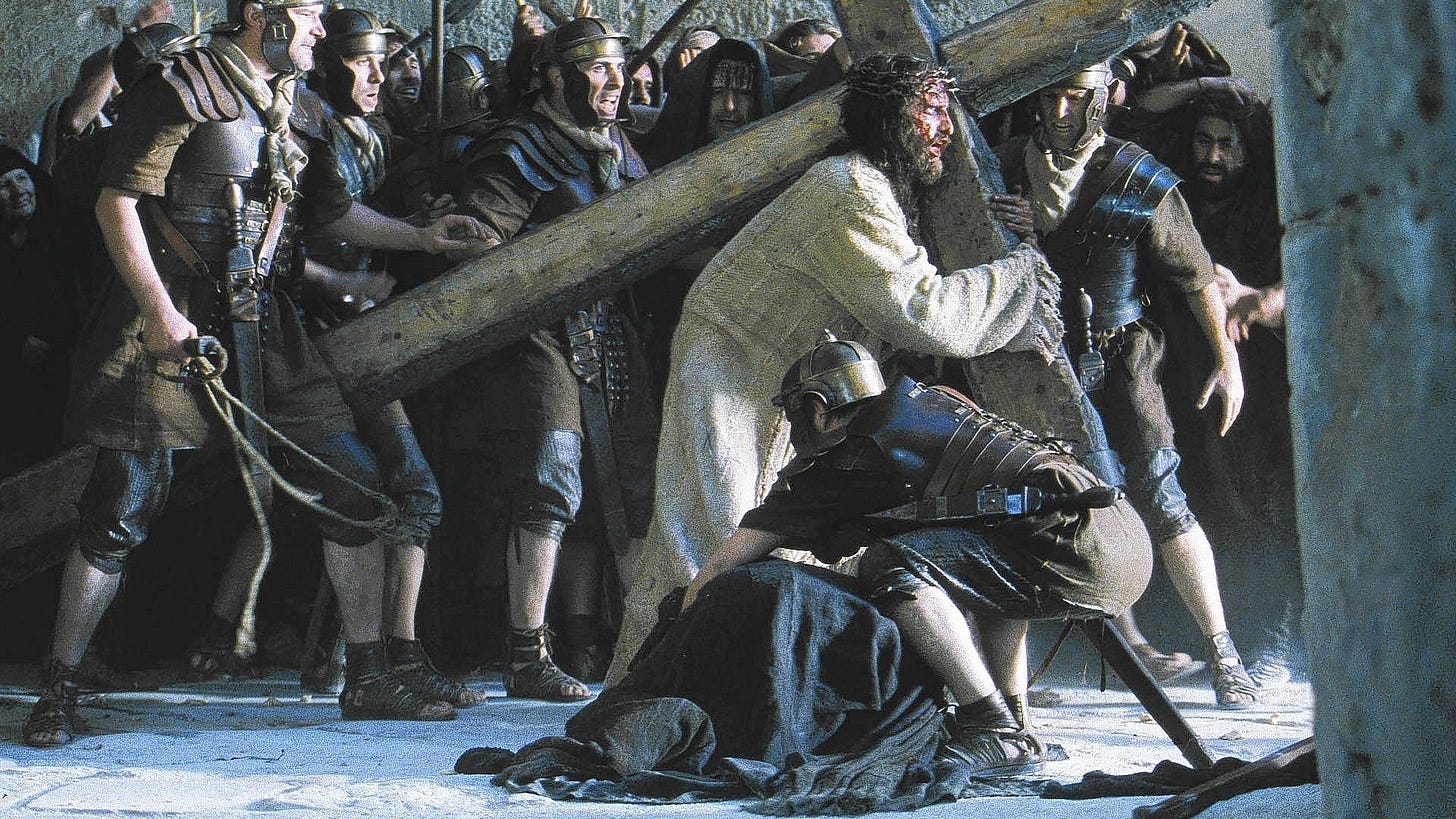100 Movies Every Catholic Should See #53: The Passion of the Christ (2004)
Produced, directed, and co-written by Mel Gibson. Starring Jim Caviezel.
“See, Mother, I make all things new”
In a time where society has become obsessed with subversion, blandness, and emptiness, there are sometimes beacons of light that serve to guide us through these seemingly unholy times. As seen in many modern churches, we have seen the loss of beauty in our imagery and architecture. Despite all of the modern world’s best efforts to suppress beauty in all forms, none other than Mel Gibson offers us as Christians to engage with what truly can be considered “cinematic icons”.
The Passion of the Christ serves as the truest form of an Icon within the 21st century, and while not the prettiest or easiest film to watch (arguably one of the most difficult films to watch), it stands as the most powerful, spiritual, and moving piece of religious cinema ever crafted.
In Andrei Tarkovsky’s Sculpting in Time, Tarkovsky very clearly expresses throughout the book that art/cinema is very much a form of worship for him, that the spirituality of his films is the core around which his entire body of work lies. While Gibson’s style and execution are vastly different to that of Tarkovsky’s in Andrei Rublev, the messaging and spirituality is very much the same. Similar to how Eastern Orthodoxy and Roman Catholicism share similar views on the nature of religious artwork, but vastly different styles of it. Gibson chooses to go for a more immersive and dramatic style, forcing us as the viewer to stare right into the face of what Christ endured for the redemption of the world. There is no way we can possibly even begin to comprehend the pain He endured for our sins, and there is no way for us to possibly repay Him. That is the Beauty of His Sacrifice, and Mel attempts to make it comprehensible to us to engage with and venerate, just as an Icon.
The most common criticism of The Passion is that it is merely an indulgent torture fest. While the pain and struggle Christ endured is among the major focuses of the film, it is the furthest thing from exploitative, but rather affectionate. Bearing witness to His suffering in detail forces the audience to endure and pray along with the film, helping us feel each whip and blow He suffered. It is not merely “look how gross this movie is”, but instead is “look at what He has done for you”. This understanding and approach is what makes this such an engaging icon.
There are some roles that when they come around and are paired with the perfect actor, it seems useless to ever reprise with anyone else. Jimmy Stewart as George Bailey, Peck as Atticus Finch, Newman as Luke, Ford as Indiana Jones, and Jim Caviezel as Jesus Christ. It is a role he seemed born to play and carries himself with extreme grace without making Him feel too distant (although I would argue that Jonathan Roumie in The Chosen plays a comparable iteration of Christ). Caviezel carries his own as the most important Person in human history, with Maia Mortenson expertly playing the greatest woman to ever live. The famous scene depicting the fourth station of the cross (Jesus meets his Mother) is amongst one of the most awe inspiring and soul-crushing scenes ever put to film, and is one example of the expert craftsmanship Gibson displays throughout this beautiful piece. The Passion of the Christ does not feel like a simple recap of the Stations or a basic reading of one of the Gospels, but a genuinely crafted meditation on what happened, with only necessary parts added to make it Gibson’s own. All of this while avoiding any heresy or misrepresentation of Christ’s message.
Editing, effects, scoring, sound, and cinematography all gleam to bring us the greatest expression of our Christian belief within this century. Many have tried throughout history to give us a meaningful and impactful portrayal of Christ, none have come anywhere close as of the writing of this, with the only contenders on the horizon being Malick and Gibson’s own Resurrection sequel. Regardless of others’ quality, The Passion of the Christ serves as the quintessential Triduum film for all Christians and will continue to endure as a cornerstone of Christian cinema.







The Passion of the Christ is my favorite religious film ever and one of my favorite movies overall. I saw it in theaters twice, first on its opening day (Ash Wednesday 2004) and then a few weeks later. Both times, it was a harrowing but sublime experience unlike anything I have ever had before. This is the only film that actually helped me improve my faith. I actually understood the Holy Sacrifice of the Mass after seeing it. Truly extraordinary.